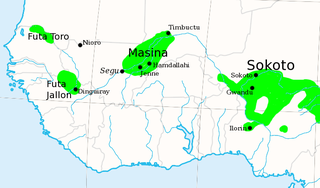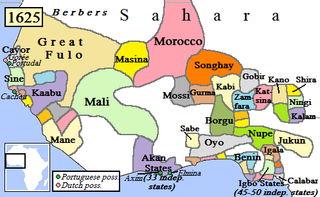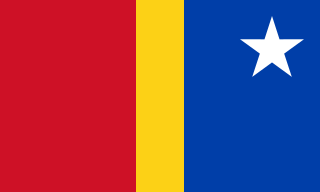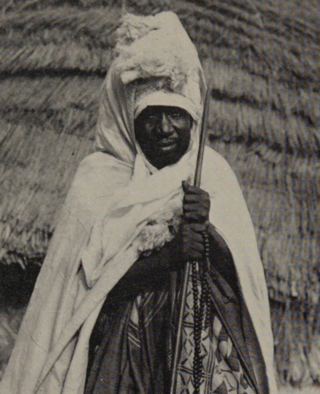
The Sokoto Caliphate, also known as the Sultanate of Sokoto, was a Sunni Muslim caliphate in West Africa. It was founded by Usman dan Fodio in 1804 during the Fulani jihads after defeating the Hausa Kingdoms in the Fulani War. The boundaries of the caliphate are part of present-day Cameroon, Burkina Faso, Niger, and Nigeria. By 1837, the Sokoto state had a population of around 10-20 plus million people, becoming the most populous empire in West Africa. It was dissolved when the British, French and Germans conquered the area in 1903 and annexed it into the newly established Northern Nigeria Protectorate, Senegambia and Niger and Kamerun respectively.

Northern Nigeria was a British protectorate which lasted from 1900 until 1914, and covered the northern part of what is now Nigeria.

Northern Nigeria was an autonomous division within Nigeria, distinctly different from the southern part of the country, with independent customs, foreign relations and security structures. In 1962, it acquired the territory of the British Northern Cameroons, which voted to become a province within Northern Nigeria.
The Big Six were six leaders of the United Gold Coast Convention (UGCC), one of the leading political parties in the British colony of the Gold Coast, known after independence as Ghana. They were detained by the colonial authorities in 1948 following disturbances that led to the killing of three World War II veterans. They are pictured on the front of the Ghana cedi notes.

The Fulajihads sometimes called the Fulani revolution were a series of jihads that occurred across West Africa during the 18th and 19th centuries, led largely by the Muslim Fulani people. The jihads and the jihad states came to an end with European colonization.
The Lapai Emirate, today in Nigeria, is a traditional state that lies near the Gurara River, a tributary to the Niger River, formerly originally inhabited where Gbari People, and presently came under the power of Nupe people, covering roughly the same area as the modern Lapai local government area.

Nigerian traditional rulers often derive their titles from the rulers of independent states or communities that existed before the formation of modern Nigeria. Although they do not have formal political power, in many cases they continue to command respect from their people and have considerable influence in their community.
The Suleja Emirate is a Hausa principality in what is now Niger State, Nigeria. The emirate was established as the Abuja Emirate during the 19th century, located just north of the site of the present-day federal capital city named Abuja. When the new city was established, the emirate and its capital were renamed the Suleja Emirate and Suleja. The emirate covers about 1,150 square miles of wooded savanna area. Suleja Emirate, Kontagora Emirate, Borgu Emirate, Agaie Emirate and Kagara Emirate were the major Emirates in Niger state.

The Kano Emirate was a Muslim state in northern Nigeria formed in 1805 during the Fulani jihad when the Muslim Hausa-led Sultanate of Kano was deposed and replaced by a new emirate which became a vassal state of the Sokoto Caliphate. During and after the British colonial period, the powers of the emirate were steadily reduced. The emirate is preserved and integrated into modern Nigeria as the Kano Emirate Council.
The Kebbi Emirate, also known as the Argungu Emirate is a traditional state based on the town of Argungu in Kebbi State, Nigeria. It is the successor to the ancient Hausa kingdom of Kebbi. The Emirate is one of four in Kebbi State, the others being the Gwandu Emirate, Yauri Emirate and Zuru Emirate.

The history of Northern Nigeria covers the history of the region form pre-historic times to the modern period of Northern Nigerian state.

The government of Northern Nigeria was modelled after the Westminster system. A premier acts as head of government and presides over the day-to-day affairs of government, while a governor acts as head of state and commander-in-chief of the constabulary. The Lower house of parliament, called the House of Assembly, is composed of elected representatives from the various provinces of the country. The Upper house of parliament, called the House of Chiefs, is similar to the British House of Lords. It is composed of unelected emirs of the various Native Authority Councils of the nation's provinces. Before 1963, the Queen of the United Kingdom served as the sovereign of Northern Nigeria.

Aliyu Ibn Abdullahi-Maje Karofi was an Emir of Kano, a state in what is now Northern Nigeria. Also known as Babba and Mai Sango- The Gun User. Emerging at the end of the Basasa, his reign was marked by a series of costly wars and fortification projects that heavily militarised the erstwhile commercial Emirate. His escapades as Emir of Kano were recorded in the official historical canon of the Kano Emirate, the Tarikh Al Kano. The ballad of Ali Zaki, commemorates his reign as the last Emir of Kano.
Ibrahim Sulu-Gambari ascended the throne as the 11th Emir of Ilorin and Chairman Kwara State Traditional Rulers Council since 1995 following the demise of his uncle, Mallam Aliyu AbdulKadir. He relinquished his position as the Presiding Justice of Court of Appeal, Lagos Division to become the Custodian of the Shehu Alimi dynasty. He is one of the 10 prominent traditional rulers in northern Nigeria.
Alhaji Saidu Umaru Namaska Dan Malam was a Nigerian traditional ruler of the Kontagora Emirate with the title Sarkin Sudan. His father Umaru Sarkin Kudu was the son of Mallam Umaru Nagwamatse, the founder of the Kontagora Emirate and a prince from Sokoto. He died on September 9, 2021, from a brief illness in National Hospital Abuja.
Umaru Nagwamatse was the founder and the first ruler of the Kontagora Emirate. He was the grandson of Usman dan Fodio and the son of the second sultan of the Sokoto Caliphate, Sultan Abu Bakr Atiku.

Muhammadu Bello KagaraHausa pronunciation:[MuhammadBelloKagara] was an educator, a writer and a royalist. He wrote the famous book novel known as Gandoki, the novel is a manuscript written during a literature bureau competition organized in 1933 by Rupert East. His book Ganɗoki was considered either first or second book to be published in the entire Northern Nigeria, the first or the second being Ruwan Bagaja by Abubakar Imam.

Hausa literature is any work written in the Hausa language. It includes poetry, prose, songwriting, music, and drama. Hausa literature includes folk literature, much of which has been transcribed, and provides a means of recording, preserving, and transmitting knowledge, especially in regard to social, psychological, spiritual, or political roles.
The Kagara Emirate is a traditional state which located in Kagara near to Birnin-Gwari town, founded by the Nagwamatse of Kontagora through Madaki Masoyi. Kagara is the capital of Rafi local government Niger State, Nigeria. The Emirate is located in Niger East Senatorial District. For administrative purpose aftermath of Dasuki reform of 1976,the Emirate is made of : Tegina, Kusharki,Kwongoma,Gunna and later additional districts were created in 1991, thus: Uregi, Kagara, Katunga, Madaka Majajan and Ringa districts.
Abu Ja was the founder of the Emirate of Abuja.











